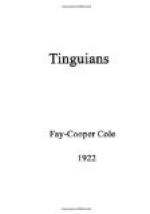A crib or sleeping basket is made out of bamboo or rattan, and this is attached to the center of a long bamboo pole, which is suspended across one corner of the room (Fig. 1, No. 2). The pole bends with each movement of the child, and thus it rocks itself to sleep. Another device in which small children are kept is known as galong-galong. This consists of a board seat attached to a strip of split rattan at each corner. Sliding up and down on these strips are vertical and horizontal pieces of reed or bamboo, which form an open box-like frame (Fig. 1, No. 1). The reeds are raised, the child is put in, and then they are slipped back in place. This device is suspended from a rafter, at such a height that it can serve either as a swing or walker, as desired.
When the mother goes to the village spring or to the river, she carries her baby with her, and invariably gives it a bath in the cold water. This she applies with her hand or a coconut shell, and frequently she ends the process by dipping the small body into the water. Apparently, the children do not enjoy the ordeal any more than European youngsters; but this early dislike for the water is soon overcome, and they go to the streams to paddle and play, and quickly become excellent swimmers. They learn that certain sluggish fish hide beneath large rocks; and oftentimes a whole troop of naked youngsters may be seen going up stream, carefully feeling under the stones, and occasionally shouting with glee, as a slippery trophy is drawn out with the bare hands. They also gather shell fish and shrimps, and their catch often adds variety to the family meal.
Children are seldom punished or scolded. All the family exhibit real affection for the youngsters, and find time to devote to them. A man is never too old or too busy to take up and amuse or caress the babies. Kissing seems to be unknown, but a similar sign of affection is given by placing the lips to the face and drawing the breath in suddenly. A mother is often heard singing to her babes, but the songs are usually improvised, and generally consist of a single sentence repeated over and over. Aside from the daily bath, the child has little to disturb it during the first five or six years of its life. It has no birthdays, its hair is never cut, unless it be that it is trimmed over the eyes to form bangs, and it wears clothing only on very special occasions. The children are by no means innocent in sexual matters; but absolute familiarity with nudity has removed all curiosity and false modesty, and the relations between the sexes are no freer than in civilized communities.




